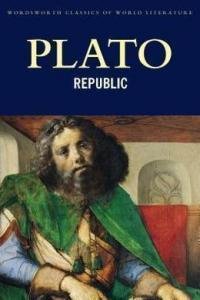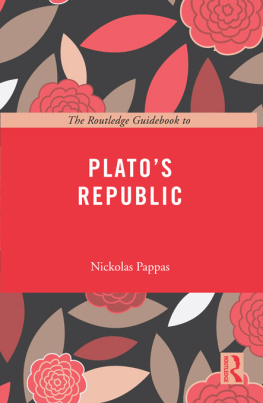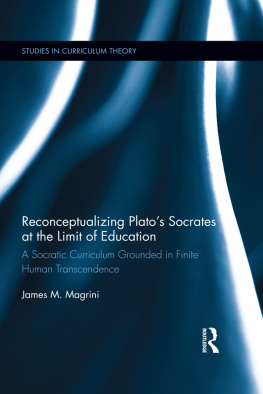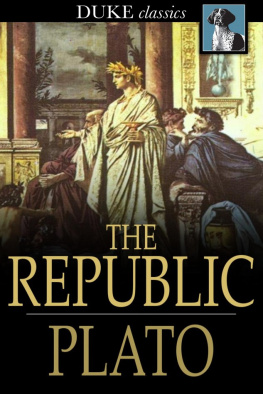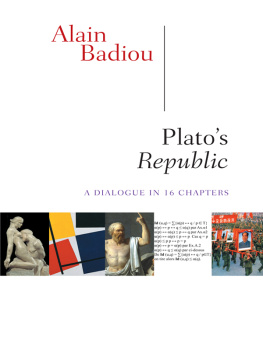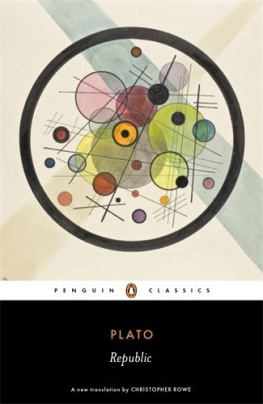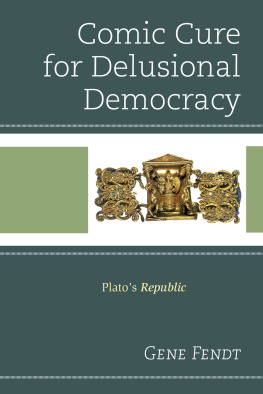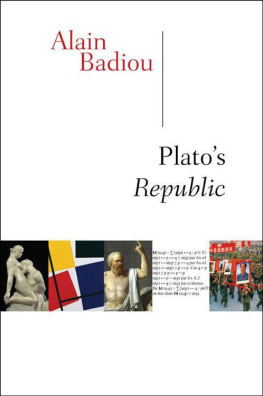
ADVISORY EDITOR: BETTY RADICE
THE REPUBLIC
PLATO (c. 427347 BC) stands with Socrates and Aristotle as one of the shapers of the whole intellectual tradition of the West. He came from a family that had long played a prominent part in Athenian politics, and it would have been natural for him to follow the same course. He declined to do so, however, disgusted by the violence and corruption of Athenian political life, and sickened especially by the execution in 399 of his friend and teacher, Socrates. Inspired by Socrates inquiries into the nature of ethical standards, Plato sought a cure for the ills of society not in politics but in philosophy, and arrived at his fundamental and lasting conviction that those ills would never cease until philosophers became rulers or rulers philosophers. At an uncertain date in the early fourth century BC he founded in Athens the Academy, the first permanent institution devoted to philosophical research and teaching, and the prototype of all western universities. He travelled extensively, notably to Sicily as political adviser to Dionysius II, ruler of Syracuse.
Plato wrote over twenty philosophical dialogues, and there are also extant under his name thirteen letters, whose genuineness is keenly disputed. His literary activity extended over perhaps half a century: few other writers have exploited so effectively the grace and precision, the flexibility and power, of Greek prose.
SIR DESMOND LEE was born in 1908 and was a scholar both at Repton School and at Corpus Christi College, Cambridge, where he gained a double first in classics. He was a fellow and tutor at Corpus Christi, and a university lecturer there from 1937 to 1948. His lifelong association with the college continued after he became headmaster of Clifton College in 1948. In 1954 he left Clifton College to take up the position of headmaster at Winchester College where he remained until 1968. In 1959, 1960 and again in 1967 he was chairman of the Headmasters Conference. Returning to Cambridge in 1968 he became Senior Research Fellow at University (now Wolfson) College, and then from 1973 to 1978 President of Hughes Hall, Cambridge.
He is also the translator of Platos Timaeus and Critias in the Penguin Classics.
Desmond Lee died in 1993.
MELISSA LANE received her PhD in philosophy from Cambridge University, where she teaches the history of political thought and political philosophy in the history faculty. She is a fellow of Kings College. Her books include Method and Politics in Platos Statesman (Cambridge University Press, 1998) and Platos Progeny: How Plato and Socrates Still Captivate the Modern Mind (Duckworth, 2001).
RACHANA KAMTEKAR teaches philosophy at the University of Michigan. Her research focuses on ancient ethical and political philosophy, and she has written on the relationship between social justice and happiness in Plato, and on moral development and moral motivation in both Plato and the Stoics. She was educated at Stanford University and the University of Chicago. She previously taught at Williams College.
PLATO
The Republic
Translated by
DESMOND LEE
With an Introduction by
MELISSA LANE
SECOND EDITION
PENGUIN BOOKS
PENGUIN CLASSICS
Published by the Penguin Group
Penguin Books Ltd, 80 Strand, London WC2R 0RL, England
Penguin Group (USA) Inc., 375 Hudson Street, New York, New York 10014, USA
Penguin Group (Canada), 90 Eglinton Avenue East, Suite 700, Toronto, Ontario, Canada M4P 2Y3
(a division of Pearson Penguin Canada Inc.)
Penguin Ireland, 25 St Stephens Green, Dublin 2, Ireland
(a division of Penguin Books Ltd)
Penguin Group (Australia), 250 Camberwell Road, Camberwell, Victoria 3124, Australia
(a division of Pearson Australia Group Pty Ltd)
Penguin Books India Pvt Ltd, 11 Community Centre, Panchsheel Park, New Delhi 110 017, India
Penguin Group (NZ), 67 Apollo Drive, Rosedale, North Shore 0632, New Zealand
(a division of Pearson New Zealand Ltd)
Penguin Books (South Africa) (Pty) Ltd, 24 Sturdee Avenue, Rosebank, Johannesburg 2196, South Africa
Penguin Books Ltd, Registered Offices: 80 Strand, London WC2R 0RL, England
www.penguin.com
First published in this translation 1955
Second edition (revised) 1974
Reprinted with additional revisions 1987
Reissued with new Further Reading 2003
Reissued with new Introduction 2007
1
Copyright H. D. P. Lee 1955, 1974, 1987
Further Reading Rachana Kamtekar, 2003
Introduction Melissa Lane, 2007
All rights reserved
Except in the United States of America, this book is sold subject to the condition that it shall not, by way of trade or otherwise, be lent, re-sold, hired out, or otherwise circulated without the publishers prior consent in any form of binding or cover other than that in which it is published and without a similar condition including this condition being imposed on the subsequent purchaser
9780141917696
Contents
APPENDIX I: THE PHILOSOPHICAL
PASSAGES IN THE REPUBLIC
APPENDIX II: THE SPINDLE OF
NECESSITY
Introduction
Exiled from his native Austria during the Second World War, the philosopher Karl Popper sought to explain how Western society had arrived at the totalitarian ideas of fascism and communism. He came to believe that at the root of this malign development, behind the usual suspects Nietzsche for Nazism, Hegel and Marx for communism lay Platos Republic. In 1945 Popper indicted the Republic as the founding text of totalitarianism, for having advocated the rule of philosopher-kings and -queens without any institutional checks and balances. He charged in effect that the ideal city depicted in the Republicwas fatally unable to cope with the key insight of liberal politics, which is that power corrupts.
In fact, the Republic does address the danger that power will corrupt. Yet at its core is a related but deeper insight: that the desire for power corrupts and, more than that, destroys. It destroys people, who in a never-ending pursuit of power undermine their psychological health. And it destroys politics, as rulers desiring power for self-gratification undermine political unity. Yet while the desire for power is dangerous, the use of power is necessary, if all but a very few rare individuals are to be able to achieve the stable order in their souls, which gives happiness, and in their polities, which gives unity.
Plato resolves the conundrum by imagining a new city governed by a rare breed of philosophers who, not wishing power for their own purposes, can use it to check and control the desire for it in their subjects. These philosophers are not only reluctant rulers; they are also capable of gaining knowledge of what is good, as opposed to the mere opinions and self-serving conventions that ordinary rulers value. In the service of this vision, the Republic invents a new understanding of knowledge; a new role for art and culture; and a new language for politics and psychology. It is this complex transformative vision of self, city, knowledge, world and culture which makes the Republic the fundamental text of Western philosophy. This introduction explores the Republics controversial perspective on the world of Plato himself, and the way in which that perspective is developed and defended in the main lines of its argument. The concluding section returns to the significance of the Republic through the ages and today.
POLITICS IN PLATOS WORLD


